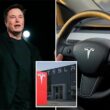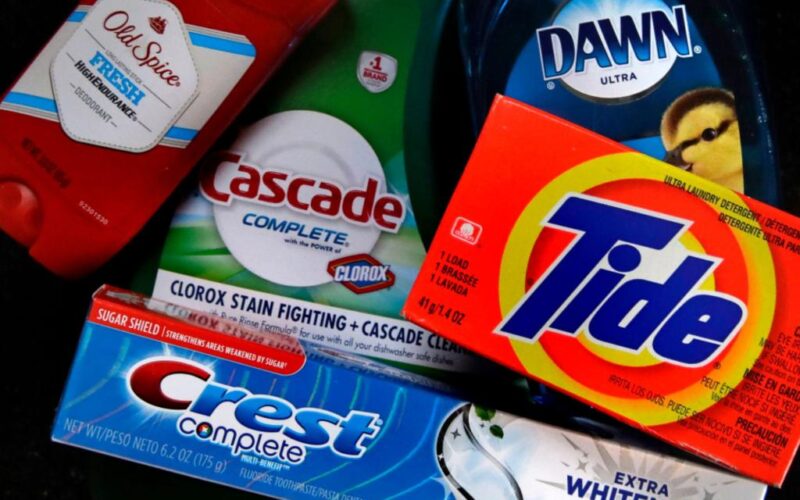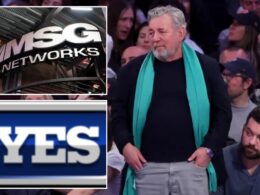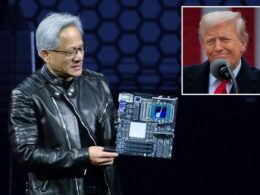Procter & Gamble, PepsiCo and LG on Thursday slashed their forecasts and warned of price hikes on everyday products ranging from toothpaste to toilet paper because of President Trump’s tariffs.
Procter & Gamble — the conglomerate behind major brands including Tide, Charmin, Bounty, Luvs and Crest — forecast flat sales growth, from a prior projection of a 2% to 4% increase.
“We will have to pull every lever we have in our arsenal to mitigate the impact of tariffs within our cost structure and P&L,” said P&G CFO Andre Schulten on a call with reporters.
Pricing and cost cuts are the main levers, Schulten said, as changing raw material sourcing from China would be complex and difficult in the short term, mainly due to a lack of options.
The price hikes would occur in the next fiscal year, which begins in July, unless there is a trade deal, he added. That’s the same time Trump is expected to lift a 90-day pause on harsh tariff rates on many nations.
P&G imports raw ingredients, packaging materials and some finished products into the US from China, while the vast majority — roughly 90% — of what it sells is produced domestically, a company spokesperson said. Trump has slapped imports from China with a 145% tax.
Schulten pointed to “a more nervous consumer” pulling back on spending in the last two months of the quarter as fears mount that the tariffs will reignite inflation.
“It’s not illogical to see the consumer adopt the ‘wait and see’ attitude, and we saw traffic down at retailers,” Schulten said. “We saw consumers basically looking for value, migrating into online, bigger box retail, into club [retailers].”
Shares of P&G were down nearly 5% in early afternoon trading as the key industry bellwether also posted a bigger-than-expected fall in third-quarter revenue.
The company reported earnings per share of $1.54, missing expectations of $1.53, and revenue of $19.78 billion, below projections of $20.11 billion, according to LSEG analysts.
Soda and snack giant PepsiCo also cut its profit forecast, warning of higher production costs and muted consumer spending due to heightened trade tensions.
“We expect more volatility and uncertainty, particularly related to global trade developments, which we expect will increase our supply chain costs,” PepsiCo CEO Ramon Laguarta said in a statement.
The company, which owns brands like Lay’s, Doritos, Gatorade and Quaker, lowered its full-year earnings forecast to a 3% decline, down from a low single-digit increase.
“Relative to where we were three months ago, we probably are not feeling as good about the consumer,” Jamie Caulfield, the firm’s chief financial officer, said.
PepsiCo is also making plans to mitigate the effects of the tariffs on its supply chain by adjusting its sourcing of key inputs, Laguarta said.
The company has two food plants in Mexico and two concentrate plants in Ireland. Both countries were hit with a 10% universal tariff on April 9 while Trump paused stiffer reciprocal levies.
Average PepsiCo prices jumped 3% in the three months ended March 22, while organic volumes declined 2%.
“Price hikes are doing the heavy lifting, with volume growth across its beloved brands like Pepsi, Gatorade, Lay’s and Doritos struggling to gain momentum,” said Aarin Chiekrie, equity analyst with Hargreaves Lansdown, on the latest results.
The firm earned $1.48 per share in the first quarter, missing estimates of $1.49, and reported revenue of $17.92 billion, above projections of $17.77 billion, according to LSEG analysts.
Electronics and home appliance maker LG also said it’s weighing price hikes, and considering potential production shifts to the US, to counter the tariffs.
“We are optimizing our production locations and also considering price hikes,” Kim I-kueon, LG’s senior vice president, said.
The South Korean company might move the manufacturing of its appliances, like washers and dryers, to its Tennessee factory. That plant’s output could cover nearly one-fifth of LG’s total home appliance sales in the US.
With Post wires








